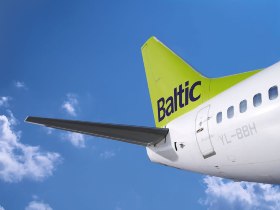Airport, EU – Baltic States, Latvia, Legislation, Transport
International Internet Magazine. Baltic States news & analytics
Thursday, 01.01.2026, 09:09
Krastins: number of flights provided by airBaltic to be cut soon
 Print version
Print version |
|---|
"The state will take no risky steps. The money will not be invested most probably, and airBaltic will adopt the Estonian Air model. This means a steep reduction in the number of flights," says Krastins, explaining: "Multiple millions of lats are needed for a different option to be chosen."
Main costs at airBaltic, and in the aviation business in general, are the fuel and aircraft lease costs. If new planes are bought on lease, no radical cost reduction may be expected, writes LETA.
"What the previous airline head Bertolt Flick tried to do was to make airBaltic an airline providing transit flights from Riga, not transport from point A to point B. Implementing a new model requires major investments, because new passengers must be attracted. One such way is to offer inexpensive tickets, which is how the project was being implemented. The number of flights and passengers was growing fast. Unfortunately, it turned out that there was not enough money for the further development of the model," said Krastins.
The failure was due to the fact that Flick's plan could not be implemented with the money that the airline had. The new strategy for airBaltic will be decided by choosing between the further development of the transit model – which means that airBaltic will continue to operate with losses, or adopting the Estonian Air model, where airports to some dozen destinations will be offered from Riga.
Finding a strategic investor will not solve the problem either, because this will change the funding source, not the business model. Besides, the state has not yet considering selling its shares in airBaltic, and there is no guarantee that anyone will be wanting to buy them. "No buyer was found for the Hungarian airline Malev, and it went bankrupt," emphasizes Krastins.
Theoretically, an airline without a hub in Europe might be interested in airBaltic. The Chinese, for instance. However, Krastins has not heard about any prospective investors. "Why invest here? There are places with much better conditions – larger populations, higher incomes. You may build an airport in Germany that will have more people living in a 100 kilometer radius than the combined population of all three Baltic countries, and their incomes are four or five times higher," explains Krastins.
Krastins denies that Flick has made any major errors, he simply failed in his calculations of how much money will be necessary for the development of airBaltic. "He thought that less money would do. Can anyone now really calculate that? Can anyone say if the euro will collapse? You cannot plan everything! If you could, no company would ever go bankrupt. There will be airlines going bankrupt in Europe this year yet," says Krastins.








 «The Baltic Course» Is Sold and Stays in Business!
«The Baltic Course» Is Sold and Stays in Business!

